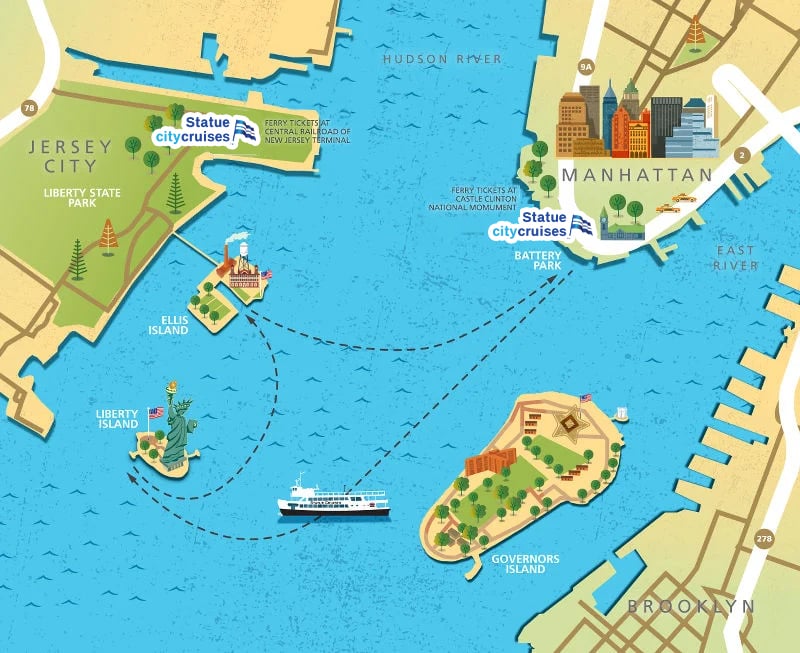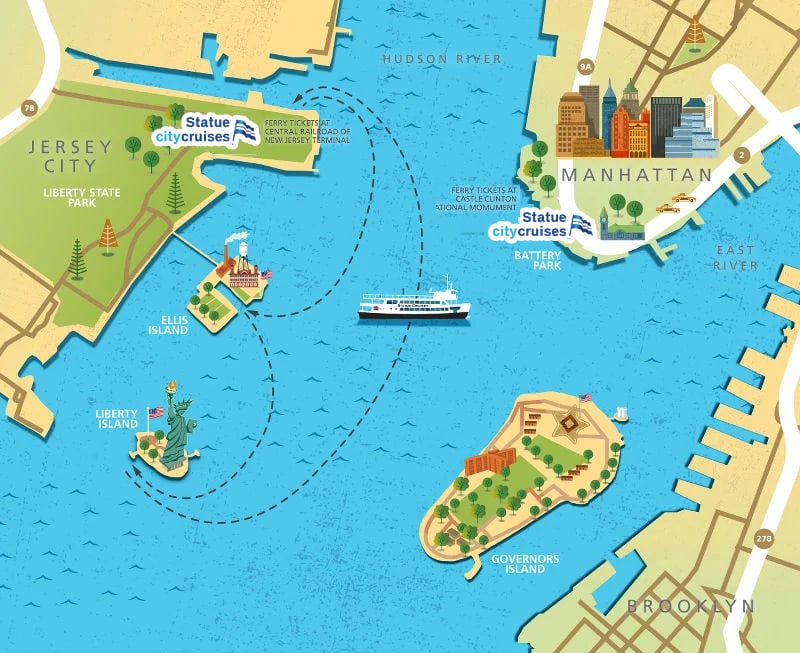Experiences We Offer
Statue Cruises Statement of Commitment to Accessibility
Statue City Cruises Accessibility
Statue City Cruises is committed to providing employees and guests with a safe, secure and respectful environment to visit and work. We believe in integration and equal opportunity. We dedicate ourselves to creating amazing experiences for all our guests and strive to meet the needs of those with disabilities.
The National Park Service Accessibility
The National Park Service wants your visit to be memorable for all the right reasons. Visiting any museum or park can be taxing as well as exciting. Visitors are urged to place health and safety first, both for yourself and your companions. Bring any medication, food, water or equipment that you may need with you. Take the time to enjoy the park safely.
Ferries: Statue City Cruises personnel are trained to aid all guests during the boarding process with direct focus on the ferry gangways. All ferries are equipped with enclosed interior and exterior areas. All ferries are outfitted with ADA compliant restrooms.
Guide/Assistance Animals at Ellis and Liberty Islands: Guide/Assistance Animals at Ellis and Liberty Islands: Service animals are defined as dogs that are individually trained to do work or perform tasks for people with disabilities. They are working animals, not pets. Examples of such work or tasks include guiding people who are blind, alerting people who are deaf, pulling a wheelchair, alerting and protecting a person who is having a seizure, reminding a person with mental illness to take prescribed medications, calming a person with Post Traumatic Stress Disorder (PTSD) during an anxiety attack, or performing other duties. The work or task an animals has been trained to provide must be directly related to the person’s disability.
Dogs whose sole function is to provide comfort or emotional support do not qualify as service animals under the Americans with Disabilities Act (ADA).
This definition does not affect or limit the broader definitions of “assistance animal” under the Fair Housing Act, or the broader definition of “service animal” under the Air Carrier Access Act.
Some State and local laws also define service animal more broadly than the ADA does.
Where Service Animals Are Allowed
Service animals are welcome in all areas of the park except for access to the Crown. Assessments have determined that allowing service animals on the Crown stairs poses a legitimate threat to the safety of the disabled handler, to other visitors in the Crown, and to the service animal itself.
Visitors who wish to make arrangements to leave their service animal in a portable kennel during their visit to the Crown should contact the park at least two weeks prior to their visit.
Service Animals Must be Under Control
Guests who use service animals must retain control of their animals at all times and should keep them on a leash or harness while visiting unless the animal is required to do otherwise in order to mitigate a person’s disability.
Inquiries, Exclusions, Charges, and Other Specific Rules Related to Service Animals
Allergies and fear of dogs are not valid reasons for denying access or refusing service to people using service animals. When a person who is allergic to dog dander, and a person who uses a service animal must spend time in the same room or facility, for example, in a school classroom or at a homeless shelter, they both should be accommodated by assigning them, if possible, to different locations within the room, or different rooms in the facility.
A person with a disability cannot be asked to remove his/her service animal from the premises unless:
(1) The animal is out of control, and the handler does not take effective action to control it.
or
(2) The dog is not housebroken.
Staff are not required to provide care or food for service animals. Borrowing a wheelchair: A very limited number of wheelchairs can be borrowed for no charge on both Ellis and Liberty Islands on a first-come, first-served basis. Borrowers must deposit a driver’s license or similar form of I.D., at the Information Desk/Center, which will be given back when the wheelchair is returned.
Borrowing a wheelchair: A very limited number of wheelchairs can be borrowed for no charge on both Ellis and Liberty Islands on a first-come, first-served basis. Borrowers must deposit a driver’s license or similar form of I.D., at the Information Desk/Center, which will be given back when the wheelchair is returned.
Accessibility services at Ellis Island
- Tactile models of the island are located near the Information Desk.
- Large print brochures in English are available upon request at the Information Desk.
- Information in Braille about Ellis Island’s history may be borrowed at the Information Desk.
- The Park Brochure in Braille is available upon request at the Information Desk.
- Audio description tours created specifically for blind and visually-impaired visitors are available.
- Elevators are located on both the east and west sides of the main building. The documentary film “Island of Hope, Island of Tears“ is open captioned.
- An assisted-listening induction loop device may be borrowed at the Information Desk.
American Sign Language Translation: If you wish to arrange for an ASL Tour, notification in writing is required at least three (3) weeks prior to your visit. Please contact us by sending an e-mail or a letter.
Emergency Medical Services: If you need assistance, contact any National Park Service employee. EMTs are available on both Ellis and Liberty Islands.
Accessibility Services at Liberty Island
- The Information Center, Gift Pavilion, Book Store, Dining facilities and exterior grounds are ADA compliant.
- Accessible restrooms are located inside the Gift Pavilion.
- An open captioned video is available in the Information Center.
- Large Print brochures, in English, are available upon request in the Information Center.
- The Park Brochure in Braille (English) is available upon request in the Information Center.
- Audio description tours created specifically for blind and visually-impaired visitors are available from our audio-tour concessioner.
- The grounds on Liberty Island are fully wheelchair accessible. For those with reservations to enter the monument, wheelchair access is provided to the museum and the exterior of Fort Wood. A wheelchair-accessible lift is available from where the main pedestal elevator stops to the top of the pedestal. The interior of the top of the pedestal, which offers views of the Statue’s inner skeletal structure, is wheelchair accessible. However, the outdoor observation deck and balcony is not wheelchair accessible.
Wheelchair Availability at Liberty and Ellis Islands
A limited number of wheelchairs are available at both Liberty and Ellis Islands (on a first-come, first-served basis). They can be borrowed, free of charge, with the deposit of a driver’s license or another form of I.D., at the Information Center (Liberty Island) and the Information Desk (Ellis Island).
American Sign Language Translation
American Sign Language Tours may be arranged prior to your visit. If you wish to arrange for an ASL Tour, notification in writing is required at least three (3) weeks prior to your visit. Please contact us by sending an e-mail or a letter.
Emergency Medical Services
Emergency Medical Services are available on both Liberty and Ellis Islands. Contact any National Park Service employee for assistance. Proper preparedness, by those visiting the park with medical conditions, can prevent emergencies from occurring. (ie. medicine, food, water, etc).
For more information and other requests
For information about programs, services, activities and requests regarding accommodations for persons with disabilities: please contact the park, in writing or email at least twenty one (21) days in advance of your intended visit. Phone: 212 363-3200. Deaf and hard-of-hearing visitors can also utilize the services of NY/NJ relay at 711.



